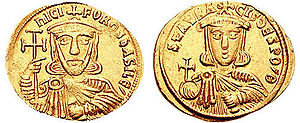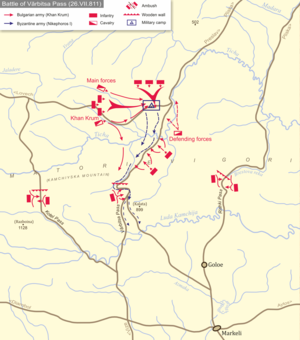Battle of the Warbiza Pass
| date | July 26, 811 |
|---|---|
| place | Pass from Warbiza , near Preslaw |
| output | Bulgarian victory |
| consequences | Death of the Byzantine Emperor |
| Parties to the conflict | |
|---|---|
| Commander | |
| Troop strength | |
| unknown | unknown |
| losses | |
|
unknown |
unknown |
The Battle of the Warbiza Pass ( Bulgarian Битката при Върбишкия проход , or Battle of Pliska ) took place about 100 km south of the Bulgarian capital Pliska in the Warbizapass (Bulgarian: Върбишки проход) on July 26, 811 between the Byzantine Empire and the Bulgarian Empire took place and led to one of the worst defeats in Byzantine history.
When Nikephorus I became Byzantine emperor in 802 , he planned to reintegrate the territory occupied by the Bulgarians into his dominion. According to Byzantine sources, in 809 he plundered Pliska , the Bulgarian capital at that time, but this is denied in more recent representations. He then settled many Anatolian families in the area. In 811 he assembled a larger army made up of Anatolian and European subjects and the imperial bodyguard, the Tagmata . Recapture seemed so easy a task that a number of high-ranking officials and aristocrats accompanied him, including his son Staurakios .
prehistory
The army was assembled in May 811 and on July 10th it set up camp near Marcellai on the Bulgarian border. Nikephoros intended to confuse the Bulgarians and launched several mock attacks over the next ten days, which were immediately recalled. During this time, the Bulgarian ruler Nikephorus offered a peace, but this was refused.
The Bulgarians used the time to gather their strength. On July 20, Nikephorus divided his army into three pillars, each of which marched north on a different route. In historiography, the view is usually held that Nikephoros took the Bulgarian capital Pliska on July 23rd. In fact, the mediaeval sources report that Nikephoros only took the aul (Greek αύλή, to German field camp, courtyard, fortified facility) of the Bulgarian Khan Krum and not the capital, which is around 100 km away. In addition, the first written mention of Pliska comes from the year 822. It can therefore be assumed that Nikephoros took another city near the Balkan Mountains and had its surroundings devastated. Krum wanted to negotiate a peace with Nikephoros again, who ignored the offer again and turned - trusting that the Bulgarians would have no chance of success against him - in the direction of Serdica (now Sofia ).
The battle
On July 25, the Byzantine troops ran into a barricade in the Balkan Mountains that the Bulgarians had erected in the valley of the Titscha River . Nikephorus saw the trap, but was forced to camp here for the night. Krum had reinforced his troops with Avars and Slavs and attacked the Byzantines on the morning of July 26th, focusing on Nikephoros' position. The Byzantines were caught in their sleep by the attack and were unable to form an effective defense. Nikephoros was probably killed right at the beginning, in any case it was quickly claimed that he was dead, which panicked the rest of the troops and caused them to flee. Many Byzantine soldiers drowned in the nearby Titscha River or were killed when the barricade was set on fire.
consequences
The defeat was the worst the Empire had suffered since the Battle of Adrianople in 378. Nikephorus' skull was used by Krum as a drinking cup , the heir to the throne Staurakios was badly wounded and hardly fit as a ruler; he was deposed a month later and his brother Michael I. replaced. During the next two years Krum was able to advance into the vicinity of Constantinople , but not take the city itself. Michael was defeated again in 813 at the Battle of Versinikia ; The Bulgarian danger only subsided when Krum died in 814.
Individual evidence
- ^ A b Daniel Ziemann: From Wandering People to Great Power: The Emergence of Bulgaria in the Early Middle Ages (7th – 9th Century), Böhlau Verlag Köln Weimar, 2007, p. 241ff.
literature
- Geoffrey Regan : The Battle of Pliska (811). In: Geoffrey Regan: Military duds and their greatest battles. Komet-Verlag, Cologne 2006, ISBN 3-89836-538-7 , pp. 114–119.
- Daniel Ziemann: From wandering people to great power. The emergence of Bulgaria in the early Middle Ages (7th – 9th centuries). Böhlau Verlag, Cologne et al. 2007, ISBN 978-3-412-09106-4 , pp. 258ff. ( Cologne historical treatises 43).

